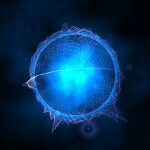Link to Pubmed [PMID] – 24721673
J Proteomics 2014 Dec;111:46-58
UNLABELLED: Actin cytoskeleton is an essential structure involved in cell migration and invasion in parasites. In Entamoeba histolytica, the protozoan parasite causing human amoebiasis, the mechanisms underlying the expression of migration-related genes are poorly understood. Here, we investigated the biological effects of ectopic overexpression of EhPC4 (positive coactivator 4) in cell migration of E. histolytica trophozoites. Using differential in gel two-dimensional electrophoresis, 33 modulated proteins were detected in EhPC4-overexpressing cells. By electrospray ionization tandem mass spectrometry (ESI-MS/MS) analysis, 16 of these proteins were identified. Interestingly, four up-regulated proteins involved in cytoskeleton organization and cell migration were identified. Particularly, we found the up-regulation of a 16-kDa actin-binding protein (EhABP16) which is a putative member of the cofilin/tropomyosin family involved in actin polymerization. EhPC4 overexpression induced a significant increase in migration of trophozoites and in the destruction of human SW480 colon cells. Consistently, silencing of gene expression by RNA interference of EhABP16 significantly impairs cell migration. These changes were associated to alterations in the organization of actin cytoskeleton, and suppression of uropod-like structure formation in EhABP16-deficient cells. In summary, we have uncovered novel proteins modulated by EhPC4, including EhABP16, with a potential role in cell migration, cytopathogenicity and virulence in E. histolytica.
BIOLOGICAL SIGNIFICANCE: The human pathogen Entamoeba histolytica infects around 50million people worldwide resulting in 40,000-100,000 deaths annually. Cell motility is a complex trait that is critical for parasites adaptation, spread and invasion processes into host tissues; it has been associated with virulence. In this study, we used a differential proteomic approach to demonstrate that E. histolytica EhPC4 induces changes in the expression of actin cytoskeleton proteins, including EhABP16, promoting a significant increase in cell motility and destruction of intestinal human cells. Particularly, we demonstrated for the first time that abrogation of EhABP16 impairs cell migration by altering the actin cytoskeleton dynamics and uropod-like structure formation in trophozoites. These data contribute to the understanding of molecular mechanisms that regulate virulence properties in this neglected protozoan parasite.

